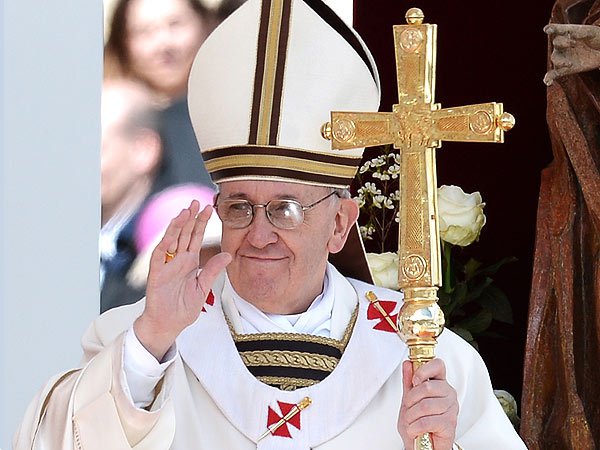                   |
Is the Office of Pope Found in the New Testament? The simple answer to this
question is, "No." There are only two offices found in the New
Testament. The more important office is the office of Elder,
the other is the office of
Deacon.
The Greek word for "elder" is presbúteros
(4245).
The Greek word for "deacon" (or better, when translated, "servant") is diákonos (1249).
The term "elder" is the most common term used in the New Testament. It
appears to describe the gravity and the honor of the leading office. A
less-frequently used word, "overseer," epískopos (1985),
emphasizes the job description of the leading office. The elders (Acts
20:17) are to be overseers (Acts 20:28) of the flock to which the Holy
Spirit has assigned them (Acts 20:28). Elders / overseers are commanded
to shepherd (poimaínō,
4165)
the church of God which He purchased with His own blood (Acts 20:28).
The task of shepherding the flock includes (1) guarding the flock
against false teachers and power-hungry leaders (Acts 20:28-32); (2)
feeding the flock (John 21:15-17); and (3) guiding the flock to a good
situation (Rev. 7:17). Elders seem to appear in the plural (Acts 14:23).
Implicit in the dogma of the Church headquartered in the Vatican is the belief that Jesus predicted He would build His church upon Peter. An examination of the Greek text demonstrates conclusively that belief is ill-founded. Here is what Jesus said to Peter: "I also say to you that you are Petros (4074, a stone), and upon this pétra (4073, large rock) I will build my Church ..." (Matt. 16:18). What did Jesus mean by "petra?" I believe He had two things in mind. (1) He would build His Church upon Peter's confession, which reads as follows, "You are the Christ, the Son of the living God" (Matt. 16:16). (2) He also meant that He would build His church upon Himself. Four times in the NT Jesus Christ is designated as the Petra. He is the Rock of offense in Rom. 9:33; He was the spiritual Rock which followed the sons of Israel in the wilderness and from which they drank spiritually (1 Cor. 10:4 - two uses here); and Peter described Jesus as "a stone (líthos, 3037) of stumbling and a rock (pétra, 4073) of offense" (1 Peter 2:8). So Peter cannot possibly be the Rock. Petros does not equal petra. Also implicit in Catholic dogma is the belief that Peter traveled to Rome and became the first Pope there. But it cannot be proven from Scripture that Peter ever set foot in Rome. Church tradition states that he did, but that fact was not important enough to be included in Scripture. Therefore it is to be rejected as a necessary doctrine. The Church headquartered in Rome, along with other churches, teaches Peter, called by Christ to be an apostle, could pass his authority on to other overseers and grant them apostolic authority. But nowhere in Scripture is this taught. The Apostles could pass on their teaching, to be sure, but Christ never authorized them to pass on their apostolic authority to any one else. That was something only Jesus Himself could do. Church leaders call this pseudo belief "Apostolic Succession." It is, however, a myth created by individuals who wish to exercise control and power over others. Paul warned the Ephesian elders against power-hungry church leaders (Acts 20:28-32). Concomitant with the false belief of Apostolic Succession is the false belief in the validity of the Monarchical Bishop. The idea of a bishop (better, "overseer") having monarchical powers is completely foreign to the New Testament. Peter, who of all people ought to know better, warned his fellow elders not to lord it over those allotted to their charge, but rather, prove to be examples (1 Peter 5:1-4). Related to this unbiblical practice of Monarchical Bishops was the unbiblical ascendancy of three local churches. After the first century, three centers of worship were gradually accorded unbiblical powers and importance. One was the "episcopal see" of Rome, another, the "episcopal see" of Alexandria, and the third, the "episcopal see" of Antioch. Constantinople was granted power in 381 and Jerusalem in 451. Gradually, over a period of time, the power of the Church of Rome was presumed to be ascendant because, it is also presumed, Peter was the first monarchical bishop there. Again, there is no evidence of this in Scripture. But the other centers never gave up their ambition. One looks in vain throughout the New Testament for any justification for granting Rome or Jerusalem or Antioch or Constantinople or Alexandria any special powers. They are all simply local churches. For the Church of Rome to claim to be the sole representative of Christ's Church in the world is, in my judgment, a sad abuse of power and the Scriptures. In conclusion, there is no Biblical office of Pope. The Pope has wrongfully been accorded vast powers and authority which cannot be substantiated in Scripture. Biblical Christians will not submit to his false authority. Return to The Bible and
Roman Catholicism
See also Comparative Theology: Items Evaluating Roman Catholicism |
|||

